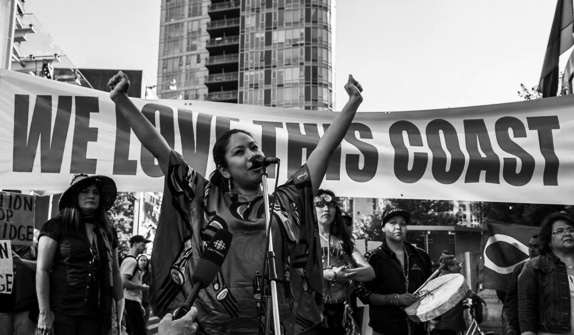What Alberta can learn from BC’s Consulting Mistakes
In the case of pipeline construction, the province needs to follow guidelines for Indigenous consultation
Nina Grossman, News Editor
Alberta should be taking notice of a recent ruling from the B.C. Supreme Court released Jan. 13. The ruling states that B.C’s provincial government neglected to properly consult First Nations on the Enbridge Northern Gateway pipeline.
B.C.’s ruling has put the Enbridge pipeline on hold. Given the economic climate in Alberta, no missteps can be taken if Premier Rachel Notley wants to avoid the same mistakes when it comes to pipeline projects in the province.
Pipeline supporters claim that a dramatic increase in production is necessary for economic growth and that pipelines would link Alberta’s oil to the global market. Despite opposition from Central Canada citing environmental risks and industry issues, the pressure is on for the construction of Energy East: TransCanada’s 4,600 km long pipeline that would transport 1.1 million barrels of oil from Hardisty, Alta. to Saint John, NB.
Proper consultation is more than just legal jargon. Section 35 of the Canadian Constitution outlines the Crown’s obligation to “Consult and Accommodate Aboriginal and Treaty Rights.” This obligation includes consultation for pipeline construction. Even if pipelines have support from corporate and government interests, First Nations groups have the power to halt construction if the proper consultation process hasn’t been followed.
The federal government delegates the duty to consult to the National Energy Board (NEB); at this time the sole regulatory board in place for regulating pipeline projects in the country. The NEB could approve Energy East’s construction, but as seen in B.C, requires proper consultation from provinces to avoid constitutionally-backed opposition that can shut down construction altogether.

Meaningful consultation on pipeline construction should be more than just empty promises | Photo courtesy of Facebook
Jennifer Pettit is the chair of Humanities at Mount Royal University. She says that in the scheme of things, “consultation is a relatively new concept.”
“Any sort of consultation that’s supposed to happen is supposed to be meaningful consultation, and it’s based on the doctrine of the honour of the crown,” she says.
Pettit emphasizes the difference between consulting and actually working together. “Consultation versus collaboration… a lot of times, even if there’s consultation, it doesn’t mean that what that consultation is finding is always having an impact on whatever project is taking place. “
Alberta’s guidelines for consultation on land and natural resource management state the province is responsible for overseeing and managing all aspects of consultation with First Nations. Such is the case in B.C, where members of different Indigenous groups from the Northern Coast have claimed that the province failed to conduct meaningful consultation and thorough environmental assessments.
The Alberta government has more than one battle to fight if it wants Energy East to become reality. Resistance is coming in the form of political, economic and social opposition, while pressure will continue to mount from the oil industry for NEB and provincial approval of pipeline construction. If Alberta wants to avoid the controversy of Northern Gateway, they need to not only follow guidelines for consultation, but engage in meaningful conversations with First Nation communities in the province.




